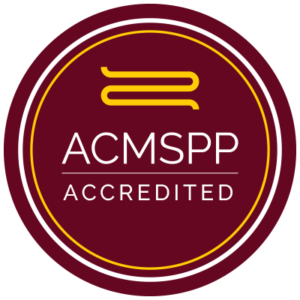We accredit the best
medical school pipeline
programs in the world.
ACMSPP
Accreditation
We accredit the best medical school pipeline
programs in the world.

ACCREDITATION STATUS:
The Accreditation Council for K-12 Medical School Preparation Pipeline Programs (ACMSPP) is an independent physician-led, not-for-profit organization that sets and monitors the core competencies and educational standards essential in preparing future medical students to thrive in pre-medical undergraduate study, medical school and beyond.
Accreditation of a medical school preparation pipeline program is a process by which a program is evaluated by a group of its peers (“peer evaluators”) in order to determine its quality. The peer evaluators perform this evaluation by conducting an in-person “site visit,” after which an accreditation decision is made by the ACMSPP Board of Commissioners. When a medical school preparation pipeline program holds ACMSPP accreditation, it means that ACMSPP recognizes that a program meets a set of designated standards and can be trusted to deliver quality education. ACMSPP is also the largest accrediting agency, accrediting medical school preparation pipeline programs throughout the United States, its territories, and internationally.
Accreditation is a peer-review, self-regulatory process by which non-governmental associations recognize educational institutions or programs that have been found to meet or exceed standards and criteria for educational quality. Accreditation also assists in the further improvement of the institutions or programs as related to resources invested, processes followed, and results achieved.
Accreditation is a seal of approval that ensures that K-12 medical school preparation pipeline programs prepare future medical students with the core competencies and clinical experience to thrive in an undergraduate pre-med program, medical school, and beyond.
Accreditation provides a framework that pushes K-12 medical school preparation pipeline programs to continually self-assess and conduct evidence-based analysis of their programs and their efficacy. These evidence-based shifts, rooted in continuous improvement, guide preparation programs to build a diverse pipeline of future medical students and excelling physicians.



The purpose of ACMSPP is to provide specialized accreditation to medical school preparation pipeline programs located in the United States, U.S. Territories, and internationally. The ACMSPP accredits programs that offer certificates and diplomas to educational non-profit 501(c)(3) organizations, academic institutions (e.g., elementary and secondary schools, career academies) and/or healthcare agencies (e.g., hospitals).
The ACMSPP is recognized by the United States Department of Education (USDE) as a specialized accrediting agency.
As the leading authority in medical school preparation accreditation, the goal of the ACMSPP is to be a supportive partner in strengthening the quality of medical school preparation pipeline programs through:
Accreditation Committee
The committee is composed of a diverse group of clinical physicians, pre-med and medical school educators, and other leaders in the medical community, all of which have completed medical school themselves and understand the fundamentals and education needed to prepare future medical students.

Gather and organize evidence to make a case that a pipeline program meets or exceeds our standards and criteria for accreditation.
The gathering of evidence is an ongoing process integrated into the providers own quality assurance systems. Throughout the accreditation cycle, providers gather and organize evidence to make a case that their medical school pipeline preparation programs meet ACMSPP standards. The Self-study Report is the collection of evidence and supporting narrative which forms the basis of the accreditation review and is the first source of information for the ACMSPP Site Visitor Team.
After providers submit their self-study report, a formative review occurs for providers. ACMSPP assigns a Site Visitor Team, composed of trained peer reviewers to conduct a formative offsite review in which they explore the quality and depth of evidence that providers use to make their case for meeting ACMSPP standards and determine the focus of the site review.
After the formative review, the Site Visitor Team then conducts a two- to three-day site review to review evidence, verify data, and examine pedagogical artifacts (e.g., lesson plans, program activities, student work samples, and videos). During the visit, the team also interviews program leaders, faculty, students, and others. The Site Visitor Team identifies the extent to which evidence supports each standard, including any particular strengths or deficiencies. The Site Visitor Team provides a written report to the provider and the Accreditation Council that includes a summary team evaluation of the completeness, quality and strength of evidence for each standard.
Four times a year, the Accreditation Council convenes to review and make accreditation decisions through a three-step process.
There are three to four Council members assigned to an initial review team. They review the following:
Clarifying questions may be directed to the representative of the pipeline program seeking accreditation and/or the lead site reviewer during the initial panel. After a thorough review, the panel prepares a written recommendation on the pipeline program seeking accreditation status.
Three to four council members review the written recommendation on the pipeline program seeking accreditation status by the lead site reviewer to ensure rigor, clarity, and consistency in accreditation recommendations. The second review team may make changes to the initial review team’s recommendations. The second review team recommendations are submitted to the full Accreditation Council.
The final accreditation decision is made based on:
Accreditation for seven (7) years is granted if the provider or medical school preparation pipeline program meets all ACMSPP Standards and components, even if areas for improvement (AFIs) are identified in the final report of the Accreditation Council.
AFIs indicate areas which must be improved by the time of the next accreditation visit. Progress reports on remediation of AFIs are submitted as part of the Annual Report. AFIs not remediated by a subsequent site review may become stipulations.
Accreditation with Stipulation(s) is granted for two (2) years if a Provider receives one (1) or more stipulations and all ACMSPP standards are met. A targeted response to the stipulations(s) must be submitted by the Provider and is reviewed by a two- to three-person virtual evaluation team. The resulting site review report is submitted to the Accreditation Council for review and consideration for stipulation removal.
Stipulations describe serious deficiencies in meeting ACMSPP Standards and/or components and must be brought into compliance in order to continue accreditation. All stipulations and relevant evidence are reviewed by the Accreditation Council. Failure to correct the condition leading to the stipulation results in probation or revocation of accreditation.
Probationary accreditation is granted for two (2) years when a Provider does not meet one (1) of the ACMSPP Standards. Failure to submit a response to the stipulation within a two (2)-year time frame results in automatic revocation. Failure to correct the condition leading to the stipulation within the specified two (2)-year period results in revocation.
A Provider must submit an Annual Report to maintain accreditation or accreditation-eligibility. The report is opened for data entry each year in January. Providers are given 90 days from the date of system availability to complete the report. ACMSPP collects and applies the data from the Annual Report to:
ACMSPP’s adverse actions are denial of accreditation if a Provider has not previously been accredited by ACMSPP and revocation of accreditation if a Provider is currently ACMSPP-accredited.
The Accreditation Council determines whether adverse action should be taken under the following circumstances:
All the above information can be found in the Accreditation Policy.


The ACMSPP accreditation program is founded on the belief that specialized accreditation indicates to the general public and to the educational community that an accredited medical school preparation program meets a set of standards and can be trusted to deliver quality education. Specialized accreditation sets standards for programs and ensures, through the self-study process and accreditation review, the promotion of effective education and program improvement. All those involved in the process must be aware of current developments in medical school preparation; the effectiveness of the current standards, criteria, policies, and procedures; and the evidence of need for change.
At the heart of ACMSPP’s philosophy of accreditation, the concept of quality enhancement presumes each accredited member institution is to be engaged in ongoing improvement of its programs and services and be able to demonstrate how well it fulfills its stated mission. Although evaluation of an institution’s educational quality and effectiveness in achieving its mission is a difficult task requiring careful analysis and professional judgment, an institution is expected to document the quality and effectiveness of all its programs and services.
ACMSPP supports the right of an institution to pursue its own educational mission as inherent in fundamental values of institutional autonomy; the right of faculty members to teach; the right of students to access opportunities for learning and for the open expression and exchange of ideas. However, the exercise of these rights should not substantially interfere with the overriding obligation of an institution to offer its students a sound educational experience that optimizes student achievement outcomes.
ACMSPP is committed to conducting an accreditation process that supports medical school preparation pipeline programs and is efficient, cost-effective and cost-accountable.
A vital component of ACMSPP operations relies on donated services, valued at more than $2 million annually, from volunteers serving as accreditation reviewers, program reviewers, and in governance. ACMSPP also receives financial support from a broad coalition of educational organizations committed to excellence in medical school preparation. Without such support from the field, accreditation costs would be uneconomical.
There are two main costs associated with the peer-review accreditation process:
The accreditation review by a panel of expert reviewers – review teams – assures the quality of the pipeline program. Accreditation Review Fees cover administrative support for the review, while Accreditation Review Expenses cover in-transit/travel costs of the review team. Elaborate accommodations, formal dinners, events, functions and gifts are against ACMSPP policy.
Annual Fees are invoiced late spring/early summer and apply to pipeline programs (candidacy or accredited). These fees cover the costs of maintaining accreditation status and support administrative operations.

ACMSPP accreditation is a peer-review process intended to enhance quality improvement in medical school preparation pipeline programs. Accreditation:
Thank you for your interest in applying for accreditation with the Accreditation Council for K-12 Medical School Preparation Pipeline Programs (ACMSPP). Any organization that operates medical school preparation pipeline programs that serve elementary and secondary students is welcome to seek accreditation through ACMSPP.
For more information, please contact us.

Co-Director/Professor of Clinical Experience
drtiano@mppacademy.org
800-799-4640 ext. 821

Co-Director/Professor of Clinical Experience
drobinna@mppacademy.org
800-799-4640 ext. 821